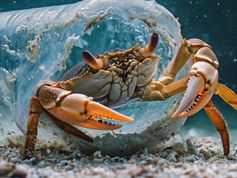Search
Ocean Acidification
- Lauren A. Moe

- Dec 23, 2022
- 4 min read
Updated: Jul 7, 2023
There’s that phrase again, “Ocean Acidification”. We’ve all heard it at least in passing, and maybe you’ve done some research so you could brush up on your scientific knowledge, only to be met with jargon, long-winded papers, or confusing chemical equations. If it makes you feel any better, I’m studying marine science in college, and it went over my head for a long time too. The good news is that I’m here to explain it in a way that hopefully makes sense.
Let’s start from the beginning; about 200 years ago when the industrial revolution was booming. People were learning that coal and oil could be burned to produce more energy than wood. This allowed for stronger machines, technological advances, and more goods to be produced for human consumption. Something we wouldn’t realize until much later is that this burning of coal, oil, and natural gas (also known as fossil fuels), was emitting harmful gasses from the factories into our air.
These fumes being produced contain the same gas that your body breathes out: carbon dioxide. When you inhale the air around you, your body uses the oxygen within it, and the waste product is carbon dioxide, or CO2. If your lungs can’t remove enough CO2, your body will go through something called “respiratory acidosis” (do you see the connection there?). The excess of this chemical causes the pH levels in your body to decrease, making your blood too acidic to fuel everyday bodily functions.
Now imagine that you are the earth, as one giant human body. Before the industrial revolution, you were breathing in oxygen, and breathing out carbon dioxide. Suddenly, fossil fuels are being burned to create energy for electricity and heat, transportation, manufacturing, and more. The clean air that you need to thrive has more CO2 in it every day. The trees that once provided you with oxygen are being cut down to provide space for the ever-growing human population. Something many people don’t realize is that the oceans contain phytoplankton, which are microscopic organisms that photosynthesize like plants, and provide between 50 and 80 percent of the oxygen in the air (but you know this, of course, because you’re Earth). As you take comfort in this, you see that the oceans are now changing as well… but why?
Carbon dioxide that is being produced from the burning of fossil fuels is split up, with about half ending up in the earth’s atmosphere, a third entering the oceans, and the rest being absorbed by land plants and trees. If you slept through chemistry in high school, bear with me here; we’re going to discuss the reactions taking place in the ocean, then talk through what they mean.
For the carbon dioxide that is absorbed into the ocean, it goes through an interesting process and turns into an unstable molecule (carbonic acid). To become stable again, it releases a hydrogen ion and becomes a new molecule (bicarbonate). The graphic below visualizes this process. This excess of hydrogen ions is key to the changes going on in the ocean.

The ocean acidification chemical process. Photo Source: Yale Sustainability









Comentarios